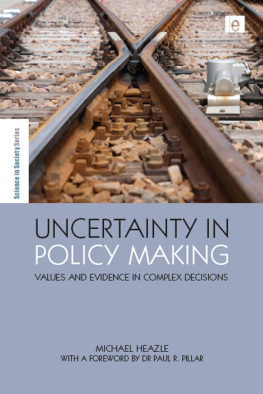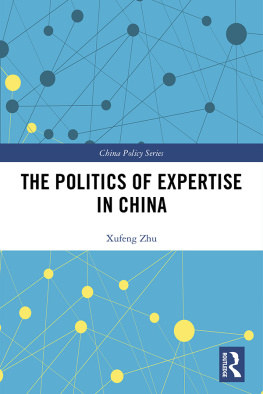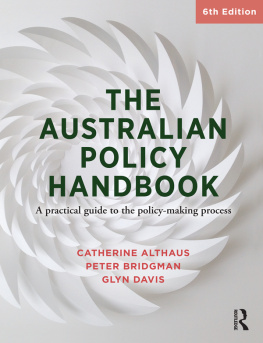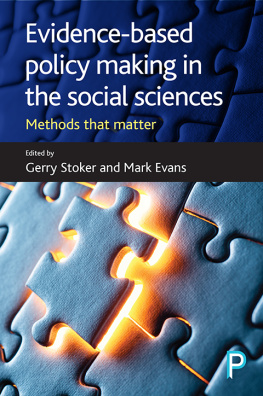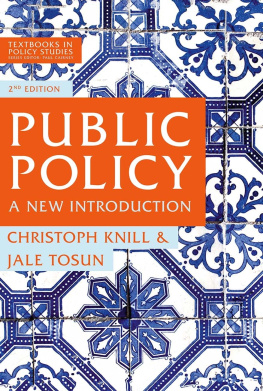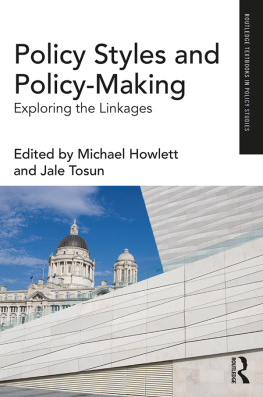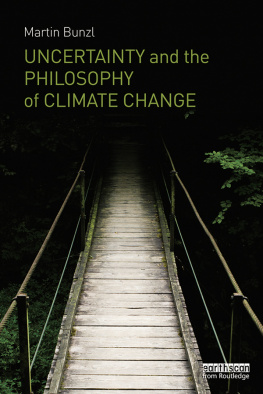Uncertainty in Policy Making
Science in Society Series
Series Editor: Steve Rayner
Institute for Science, Innovation and Society, University of Oxford
Editorial Board: Gary Kass, Anne Kerr, Melissa Leach, Angela Liberatore,
Stan Metcalfe, Paul Nightingale, Timothy O'Riordan, Nick Pidgeon, Ortwin Renn,
Dan Sarewitz, Andrew Webster, James Wilsdon, Steve Yearley
Animals as Biotechnology
Ethics, Sustainability and Critical Animal Studies
Richard Twine
Business Planning for Turbulent Times
New Methods for Applying Scenarios
Edited by Rafael Ramrez, John W. Selsky and Kees van der Heijden
Debating Climate Change
Pathways through Argument to Agreement
Elizabeth L. Malone
Democratizing Technology
Risk, Responsibility and the Regulation of Chemicals
Anne Chapman
Genomics and Society
Legal, Ethical and Social Dimensions
Edited by George Gaskell and Martin W. Bauer
Influenza and Public Health
Learning from Past Pandemics
Edited by Tamara Giles-Vernick and Susan Craddock, with Jennifer Gunn
Marginalized Reproduction
Ethnicity, Infertility and Reproductive Technologies
Lorraine Culley, Nicky Hudson and Floor van Rooij
Nanotechnology
Risk, Ethics and Law
Edited by Geoffrey Hunt and Michael Mehta
Resolving Messy Policy Problems
Handling Conflict in Environmental, Transport, Health and Ageing Policy
Steven Ney
Uncertainty in Policy Making
Values and Evidence in Complex Decisions
Michael Heazle
Unnatural Selection
The Challenges of Engineering Tomorrow's People
Edited by Peter Healey and Steve Rayner
Vaccine Anxieties
Global Science, Child Health and Society
Melissa Leach and James Fairhead
A Web of Prevention
Biological Weapons, Life Sciences and the Governance of Research
Edited by Brian Rappert and Caitrona McLeish
Uncertainty in Policy Making
Values and Evidence in Complex Decisions
Michael Heazle
First published by Earthscan in the UK and USA in 2010
For a full list of publications please contact:
Earthscan
2 Park Square, Milton Park, Abingdon, Oxon OX14 4RN
711 Third Avenue, New York, NY 10017
Earthscan is an imprint of the Taylor & Francis Group, an informa business
Copyright Michael Heazle, 2010. Published by Taylor & Francis.
The moral right of the author has been asserted.
All rights reserved. No part of this book may be reprinted or reproduced or utilised in any form or by any electronic, mechanical, or other means, now known or hereafter invented, including photocopying and recording, or in any information storage or retrieval system, without permission in writing from the publishers.
Notices
Practitioners and researchers must always rely on their own experience and knowledge in evaluating and using any information, methods, compounds, or experiments described herein. In using such information or methods they should be mindful of their own safety and the safety of others, including parties for whom they have a professional responsibility.
Product or corporate names may be trademarks or registered trademarks, and are used only for identification and explanation without intent to infringe.
ISBN: 978-1-84971-083-1 hardback
Typeset by Composition and Design Services
Cover design by Susanne Harris
A catalogue record for this book is available from the British Library
Library of Congress Cataloging-in-Publication Data
Heazle, Michael.
Uncertainty in policy making: values and evidence in complex decisions/Michael Heazle.
p. cm.
Includes bibliographical references and index.
ISBN 978-1-84971-083-1 (hardback)
1. Political planningUnited States. 2. United StatesPolitics and government. 3. Policy sciences. I. Title.
JK468.P64H43 2010
320.6dc22
2010005699
For Kazu, Alexi and Jake, and my parents
List of Figures and Tables
Figures
Tables
Foreword
Policy makers habitually portray the policies they make as flowing, directly and inexorably, from facts. Strong political incentives underlie such portrayals. The policy maker looks good in so far as he is perceived to be acting on facts rather than on beliefs, hunches or wishes. He looks informed rather than ignorant. He also is better able to muster support for his policy, which he depicts as a product of reality rather than ideology. Wars or other policy departures are presented as acts of necessity rather than of choice.
An outstanding example, one of those that Michael Heazle examines in this volume, was the adducing of supposed facts about unconventional weapons programmes as one of the chief rationales for launching a US-led offensive war against Iraq in 2003. The Iraq War was an extreme instance of an ostensibly fact-based case being used to sell a policy decision that was reached in other ways and on other grounds. The famously flawed intelligence analysis about Iraqi weapons that became associated with that war had not been requested (or, at the highest levels, even read) by the US administration of George W. Bush, which, in any case, had no process for examining whether initiating the war was a good idea. Whatever empirical input flawed or accurate, on weapons programmes or anything else that might have been relevant to Bush's war decision had no opportunity to influence it, at least as far as a formal governmental process was concerned. The war was the product of instinct, ideology and long-held wishes to remake the politics and economics of the Middle East. It did not stem from the ostensible, and mistaken, facts that were used to sell it.
Although the Iraq War was an extreme case, it was by no means the only instance of a policy issue being coloured, and even redefined, as an intelligence issue. The Cold War presented other examples, including ones involving the strategic arms race with the Soviet Union and Moscow's relations with violent revolutionary groups. Hard-fought battles in the 1970s and 1980s over intelligence assessments on these subjects, purportedly to establish an accurate factual basis for making policy, were really ideologically driven contests over the policy itself.
For the ideologically committed, depicting policy issues as factual or intelligence issues has the aforementioned advantage of salesmanship. For the less committed or the less involved or less informed, such as members of legislatures who must vote on policies the wisdom of which they are unsure this depiction offers a different attraction. It relieves (or rather, appears to relieve) the individual from making his own judgement about policy. My duty, he can say, is just to follow the facts.

